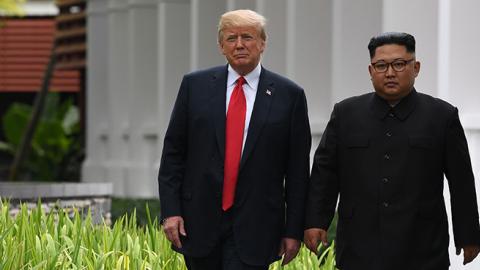The Korean Peninsula is no longer on the brink of war, which seemed like a real possibility in 2017, and the memory of U.S. President Donald Trump’s “fire and fury” rhetoric has faded. Trump’s summit with North Korean leader Kim Jong Un in Singapore last year set a different tone. But the geopolitical consequences of diplomatic failure, or so-called success—faux peace without real denuclearization—have not grown less terrifying as the prospect of a "second summit":https://www.nytimes.com/2019/01/10/world/asia/north-south-korea-moon-ki… looms.
After a year of high-level U.S. engagement with North Korea’s dynastic dictator, Pyongyang retains a formidable nuclear missile capability, while the historically ironclad U.S.-South Korean alliance is fraying around the edges.
For the moment, diplomacy remains preferable to the alternatives. Talking has achieved more than symbolic gains.Talking has achieved more than symbolic gains. North Korea continues a moratorium on nuclear and missile testing, and Kim has proclaimed the closure of his main nuclear testing range and an intercontinental ballistic missile engine test facility.
But those steps are a far cry from the elimination of fissile material and nuclear warheads, and further still from final, fully verified denuclearization of the peninsula.
Meanwhile, alliance readiness is eroding. The United States and South Korea have suspended major joint military exercises, and in agreement with Pyongyang, Seoul has established no-fly zones along the Demilitarized Zone and disarmed the Joint Security Area on the North-South border. A deadline for a new alliance burden-sharing agreement has come and gone. And with the U.S. president’s periodic ambivalence toward forward-based military forces, Pyongyang may mistake carelessness for not caring about the alliance.
At some point, if talking with Kim garners such marginal gains, U.S. and South Korean officials must focus anew on a strong alliance based on a shared commitment to democratic and free-market values. That point may be closer than the countries’ leaders wish, especially if Kim holds a second summit with Trump that does not lead to concrete steps toward denuclearization.
Alliances end when the threats they are poised against disappear, and there is no consensus on a new raison d’être. The procedural trappings of alliances may endure, but disputes over burden-sharing and other political issues eventually expose the security relationship to be an empty vessel.
Last week, Chinese President Xi Jinping "called on":https://www.wsj.com/articles/north-koreas-kim-chinas-xi-hold-talks-in-b… the United States to meet North Korea “in the middle,” which was perhaps his way of pressuring Trump to make unilateral concessions. Unfortunately, it would soon become apparent that the middle of appeasement is still appeasement. Half-measures can fail wholly.
Yet a middle way, between the fantasy of Kim swiftly abandoning the only means he has of guaranteeing his survival and Pyongyang’s delusion that the United States will allow Kim to modernize North Korea without relinquishing his most threatening military systems, remains imaginable.
The challenge is to embrace the concept of reciprocity, the most axiomatic of prerequisites for successful negotiation.
Reciprocity works in theory but perhaps not in practice, when comparing the apples of peace agreements and sanctions relief with the oranges of denuclearization. Thus the ongoing stalemate, with Kim not sure what he is willing or able to give up by way of his arsenal of weapons of mass destruction and the Trump administration undecided on what quid pro quo it would be willing to put on the table.














